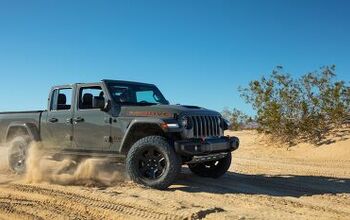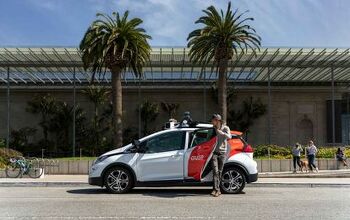Mini Dealers Want to Know What the Hell Is Going on With the Brand

Sales of the Mini brand have been in a downward spiral since 2013 and U.S. dealerships want to know what expect in the future. Any prospects for the nameplate to grow into a volume brand appears to have been thrown out the window by BMW Group, and it’s now looking like it could shift into electrification.
Dealers, however, don’t know this for sure, and hope to gain clarity on the matter as the domestic market dives deeper into its appreciation for trucks, SUVs, and crossovers.
“I don’t think the dealers have a very clear vision of where the car line is going long term,” explained Jason Willis, member of the Mini National Dealer Council. “There is a lot of pride on being a small-car performance company, so my guess is we will continue to be a small-car company. But as far as electric and how we fit in, we’re still waiting to hear that plan.”
In an extended interview with Automotive News, Willis expressed his concerns over the electrification of the brand — and what he hopes to learn next month, when BMW Group’s board meets with Mini retailers after the 2018 National Automobile Dealers Association.
“With less cars sold, dealers had to be much more aggressive closing car deals and coming to agreements with customers,” Willis said. “So our profit margins on sales definitely shrunk year over year. Overall dealer profitability is worse in 2017 than it was in 2016. It was [because of lower] new-car volume and new-car grosses combined … The profitability potential of a Mini is relatively low compared to other manufacturers who sell in similar price ranges.”
The solution is to make the cars more appetizing to a specific kind of customer. Mini doesn’t make big SUVs and trucks and shouldn’t bother marketing its vehicles on mass appeal. Fortunately, this is one aspect of the problem the manufacturer already seems to have gotten a handle on.
“Mini did change advertising companies,” explained Willis. “So we have a new advertising game plan that will be much more focused on the vehicle and the luxury and the performance and the fun that Mini brings and less focused on social issues or other types of advertising Mini has done in the past. The Super Bowl commercial last year, the theme was that Mini is for everybody, but it was very little about the car.”
He went on to say that dealers have been largely happy with the direction its marketing has taken. An emphasis on fun, Willis noted, is more in line with the brand’s core values, but Mini USA is still fighting for a bigger advertising budget.
Willis also noted that the lineup isn’t going to change for a while. While there will be some refreshed models coming out over the next two years (and an battery-electric Cooper in 2019), no other redesigns or new models are likely until at least 2020. That’s a problem. Dealers know that small cars are an important part of Mini’s identity but they are also aware that the U.S. isn’t so keen on them right now. Willis said it might be prudent for the brand to at least attempt to offer something more mainstream in the future, noting the success of Porsche and Jaguar’s push into utility vehicles.
“I believe there’s room in the model lineup for [something bigger than the Countryman]. I also believe there’s room for a halo car, whether it be the Superleggera, the two-door convertible concept shown two or three years ago,” said Willis. “We continue to have customers come in and ask about it and wonder when they can buy it. That is a wow, got-to-have product, and that is the type of thing that really shows what Mini can be.”
Additionally, he said he’d like to see more leasing and would not be surprised if the company introduced a subscription service — but noted he hasn’t heard anything official on the matter. Overall, what Willis and the rest of the dealer network wants are answers. They want to know if Mini is destined to remain a niche brand fighting for its life amid declining sales or if the manufacturer has some kind of master plan that involves SUVs or electrification.
For now, BMW Group looks to be taking a steady-as-she-goes approach as it considers what is to be done. But we doubt an answer like that will satisfy those hurting dealerships.
[Images: BMW Group]

A staunch consumer advocate tracking industry trends and regulation. Before joining TTAC, Matt spent a decade working for marketing and research firms based in NYC. Clients included several of the world’s largest automakers, global tire brands, and aftermarket part suppliers. Dissatisfied with the corporate world and resentful of having to wear suits everyday, he pivoted to writing about cars. Since then, that man has become an ardent supporter of the right-to-repair movement, been interviewed on the auto industry by national radio broadcasts, driven more rental cars than anyone ever should, participated in amateur rallying events, and received the requisite minimum training as sanctioned by the SCCA. Handy with a wrench, Matt grew up surrounded by Detroit auto workers and managed to get a pizza delivery job before he was legally eligible. He later found himself driving box trucks through Manhattan, guaranteeing future sympathy for actual truckers. He continues to conduct research pertaining to the automotive sector as an independent contractor and has since moved back to his native Michigan, closer to where the cars are born. A contrarian, Matt claims to prefer understeer — stating that front and all-wheel drive vehicles cater best to his driving style.
More by Matt Posky
Latest Car Reviews
Read moreLatest Product Reviews
Read moreRecent Comments
- Corey Lewis It's not competitive against others in the class, as my review discussed. https://www.thetruthaboutcars.com/cars/chevrolet/rental-review-the-2023-chevrolet-malibu-last-domestic-midsize-standing-44502760
- Turbo Is Black Magic My wife had one of these back in 06, did a ton of work to it… supercharger, full exhaust, full suspension.. it was a blast to drive even though it was still hilariously slow. Great for drive in nights, open the hatch fold the seats flat and just relax.Also this thing is a great example of how far we have come in crash safety even since just 2005… go look at these old crash tests now and I cringe at what a modern electric tank would do to this thing.
- MaintenanceCosts Whenever the topic of the xB comes up…Me: "The style is fun. The combination of the box shape and the aggressive detailing is very JDM."Wife: "Those are ghetto."Me: "They're smaller than a Corolla outside and have the space of a RAV4 inside."Wife: "Those are ghetto."Me: "They're kind of fun to drive with a stick."Wife: "Those are ghetto."It's one of a few cars (including its fellow box, the Ford Flex) on which we will just never see eye to eye.
- Oberkanone The alternative is a more expensive SUV. Yes, it will be missed.
- Ajla I did like this one.



































Comments
Join the conversation
I remember a while back when there was a call to common decency on TTAC, with moderators stepping up to clean up the room. markf, HighDesertCat and now Brendon from Canada have jumped in with boorish, knuckle dragging comments about female MINI drivers. WTF!
Mini makes about as much sense as a stand alone brand as Smart did ... none at all. How do so many well paid people make such obvious mistakes? The Mini is a retro niche product much like the "New Bug". It might make sense as a model in a larger lineup, but is absurd as a brand. Bring back the Death Watch series.